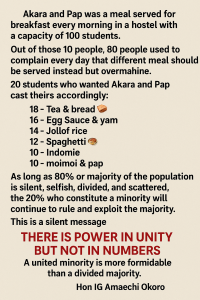According to Diaspora digital media (DDM), in a 100-student hostel, breakfast became a source of daily frustration.
Every morning, Akara and Pap was served to all residents.
While 80 students disliked the meal, only 20 were satisfied with it.
Despite their complaints, the majority failed to agree on a single alternative.
To resolve the issue, the hostel warden introduced a democratic voting system.
According to the rule, students would vote each night for the next day’s meal.
The meal with the highest votes would be served in the morning.
The expectation was that fairness and majority rule would prevail.
However, when voting began, a pattern emerged.
The 20 students who liked Akara and Pap always voted for the same meal.
Meanwhile, the remaining 80 students split their votes among six different options.
Their votes were divided as follows:
18 votes – Tea and Bread 🥪🍞
16 votes – Egg Sauce & Yam
14 votes – Jollof Rice
12 votes – Spaghetti 🍝
10 votes – Indomie
10 votes – Moimoi & Pap
Although the majority wanted a different meal, their division weakened their influence.
No single alternative ever received enough votes to surpass Akara and Pap.
As a result, the same meal kept winning every evening.
Each morning, the majority had to eat what they did not want.
How this reflects Nigeria’s political reality
This situation closely mirrors Nigeria’s political landscape.
In every election, millions of Nigerians express frustration over leadership.
Many citizens want better governance, accountability, and development.
However, they often fail to unite under a single political force.
Just like the 80 students, Nigerians divide their support among multiple opposition candidates.
Meanwhile, a smaller but well-organized group consistently backs the ruling party.
This guarantees their victory, even when they are the unpopular choice.
The ruling class understands the power of unity, strategy, and consistency.
They ensure their supporters vote together and remain loyal.
On the other hand, opposition parties struggle with internal conflicts and divisions.
Their inability to form a united front allows the minority to dominate.
Complaints, protests, and social media activism do not translate into political power.
Without collective action, the cycle of bad governance continues.
The power of unity over numbers
This lesson is simple: majority without unity is powerless.
Numbers alone do not guarantee victory—organization, focus, and collaboration do.
If Nigerians truly want change, they must set aside differences and unite behind a common goal.
Otherwise, a determined minority will continue to rule a scattered majority.








